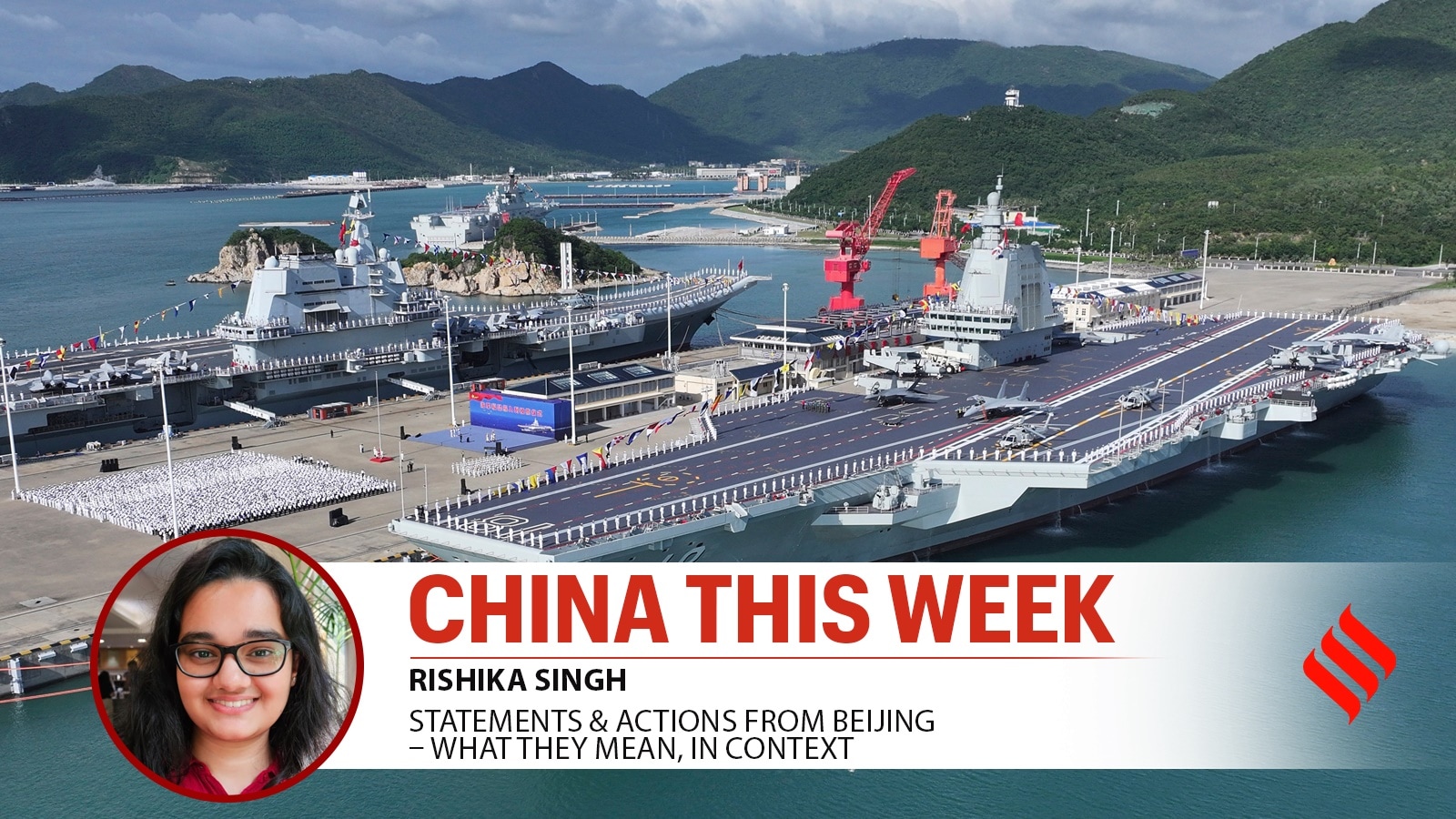The past week saw several notable developments in trade between the United States and China.
It is essential to recall that trade issues between the countries contributed to the US’s imposition of global tariffs earlier this year. China’s relaxations on some imports from the US, like on farm produce and some minerals, in the last week are being read as positive after-effects of a meeting between leaders Donald Trump and Xi Jinping in late October.

Then, China commissioned its “first electromagnetic catapults-equipped aircraft carrier”, according to the Chinese Communist Party’s daily Global Times. Fujian is named after a province on China’s southeastern coast, which is the closest to Taiwan, the island on which China lays territorial claims.
Finally, we look at the French government’s requests to the EU for investigating the Chinese-origin fashion giant Shein, and for banning it over the “sale of child-like sex dolls and banned weapons on its marketplace”, Reuters reported. Shein has faced troubles in several other countries in recent years, on a range of issues.
Here is a closer look at these developments:
1. Relaxation of curbs on US goods, from agri to minerals
According to a Reuters report on Friday (November 7), China will restore soybean import licences for three US firms and lift its suspension on log imports from November 10. In March, restrictions were imposed on a global grains exporter and export grain terminal operator.
Another report on Saturday said that the government suspended a ban on exports of minerals gallium, germanium and antimony to the US, while still retaining some licensing requirements.
UPSHOT: Agricultural trade has emerged as an important bilateral issue for the countries. China’s gradual turn from the US to South America to meet its high demand for soybeans (stemming from livestock requirements and as an oilseed) has been in the making for years, in a bid to reduce reliance on the country. For Trump, however, soybean farmers and rural voters in general are important political constituencies.
Story continues below this ad
Following the Trump-Xi meeting, US Treasury Secretary Scott Bessent said that China made commitments to purchase certain quantities of soybeans for the next three years. According to Reuters, the lack of Chinese demand of late “has squeezed U.S. farm incomes as crop prices hovered near multi-year lows for months amid rising costs for fertilizer, seeds, labour and equipment.”
Coming to the three minerals, China instituted restrictions on their exports to the US from 2023 to 2024. They are mostly used in computers, defence, and renewable energy technology. Gallium is also used to manufacture semiconductors, crucial for building technological products.
2. China’s largest warship commissioned
Fujian, the largest warship of the People’s Liberation Army Navy (PLAN) and also its third aircraft carrier, was commissioned into active service on Wednesday.
Xi Jinping was in attendance, and according to state media, he had asked for electromagnetic catapults to be incorporated in the warship. The complex feature will allow aircraft to take off without needing a ramp or a long runway. China now has the third-highest number of aircraft carriers globally, after the United States’ 11.
Story continues below this ad
UPSHOT: A report in Global Times, the English daily of the Chinese Communist Party, quoted an expert as noting three advantages of Fujian — electromagnetic catapult system enabling aircraft to take off easily with full fuel and ammunition, a significant increase in aircraft carrier sorties, and the formation of a more capable far seas combat system.
China is still quite behind the US, which boasts the most advanced military in the world, but the warship is an important asset nonetheless. It will likely be spotted near Taiwan and in the South China Sea. Interestingly, Xi Jinping himself worked in the province of Fujian at various levels, including as its Governor, for more than 20 years.
The aforementioned expert told Global Times, “The commissioning of the Fujian makes the deployment of dual carriers in the PLA South China Fleet a reality, which will undoubtedly have a strategic deterrence effect on the ‘Taiwan independence’ secessionist forces and some certain countries with malicious intentions toward China.”
3. France turns up the heat on Shein
A statement from the office of French Prime Minister Sébastien Lecornu said, “On the instructions of the prime minister, the government is initiating the procedure to suspend Shein for the time necessary for the platform to demonstrate to the public authorities that all of its content is finally in compliance with our laws and regulations.” However, an actual ban would likely take longer to get certain approvals.
Story continues below this ad
UPSHOT: Just this month, Shein opened its first physical store in Paris. The company is primarily an online enterprise that has become synonymous with trendy clothes at dirt-cheap prices. In some regions, it also sells accessories and other items.
Shein was founded in 2012 by Chinese entrepreneur Chris Xu and is now seen as having mastered the quick production of new designs, leaving behind other fast-fashion companies, such as H&M. It is not a big player domestically and has its headquarters in Singapore, like many other global Chinese companies (such as TikTok).
For all the hype and sales around it, the company has come under severe criticism over slave labour and worker exploitation, and the cheap quality of its products. An association of German retailers recently asked the EU to clamp down on Shein. The Indian government banned it in 2020 alongside other Chinese mobile apps over national security concerns, following the military standoff over the Line of Actual Control (LAC).
However, it returned this year after a partnership with Reliance’s retail firm, with a stated focus on manufacturing and sourcing from India.








































